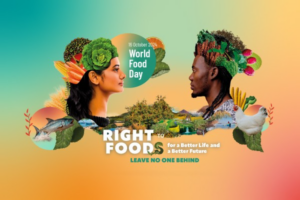This week, around the world, hundreds of events are taking place to mark World Food Day 2024 and call for action in over 50 languages.
Let us answer the call this World Food Day for the Right to Foods for a Better Life and a Better Future.
Let’s renew our commitment to building efficient, inclusive, resilient, and sustainable agrifood systems that guarantee the right to good food for all, for today and for tomorrow.
Together, we can get back on track to achieving the 2030 Agenda for Sustainable Development by transforming agrifood systems under the overarching Four Betters.
Thank you, and Happy World Food Day, and Happy Birthday to FAO!
With this urgent appeal, Dr QU Dongyu, the Director-General of FAO, concluded his opening statement on Wednesday, 16 October, celebrating the 45th World Food Day.

This year’s World Food Day theme, Right to Foods for a Better Life and a Better Future, is a timely reminder that all people have the right to adequate food. The same urgent appeal was echoed in messages from King Letsie III of Lesotho, Pope Francis, UN Secretary-General António Guterres, Francesco Lollobrigida, Minister of Agriculture, Food Sovereignty and Forestry, Italy, Cindy McCain, Executive Director of the WFP, Ophelia Nick, Parliamentary State Secretary, Federal Ministry of Food and Agriculture of Germany, Gérardine Mukeshimana, Vice-President of IFAD, and Jeffrey Prescott, US Ambassador to the UN Agencies in Rome.
Human rights such as the right to food, life, liberty, work, and education are recognised by the Universal Declaration of Human Rights and legally binding international covenants. Yet, 783 million people live in conditions of extreme food insecurity, while 3.1 billion suffer from malnutrition, as they cannot afford proper nutrition, leading to serious health consequences. Poor nutrition is the main cause of all forms of malnutrition, including undernourishment, micronutrient deficiencies, and obesity, which are now present in most countries and across socioeconomic classes.
Today, far too many people go hungry and cannot afford to eat a healthy diet. The most vulnerable are often forced to consume only staple foods or cheap—often unhealthy—products, while others do not have access to fresh or diversified food. Hunger and malnutrition are further exacerbated by crises caused by factors such as armed conflicts, extreme weather events, and economic shocks. Agri-food systems are vulnerable to disasters and crises, climate change, pollution, degradation of soil, water, and air, greenhouse gas emissions, and biodiversity loss.
By transforming agri-food systems, we can mitigate climate change and ensure peaceful, resilient, and inclusive livelihoods for all.
The celebrations continue with more events, including the Junior World Food Day, the FAO Science and Innovation Forum, the FAO Hand-in-Hand Investment Forum, the Global Family Farming Forum, the High-Level Rome Water Dialogue on WASAG (Global Framework on Water Scarcity in Agriculture), and the Global-Hub on Indigenous Peoples’ Food Systems.
As World Food Day celebrations continue alongside key forums and discussions, the commitment to achieving the “Four Betters”—better production, better nutrition, better environment, and better life—becomes more critical than ever. Let us all join together in this global effort to ensure the right to food for a healthier, more sustainable future.


